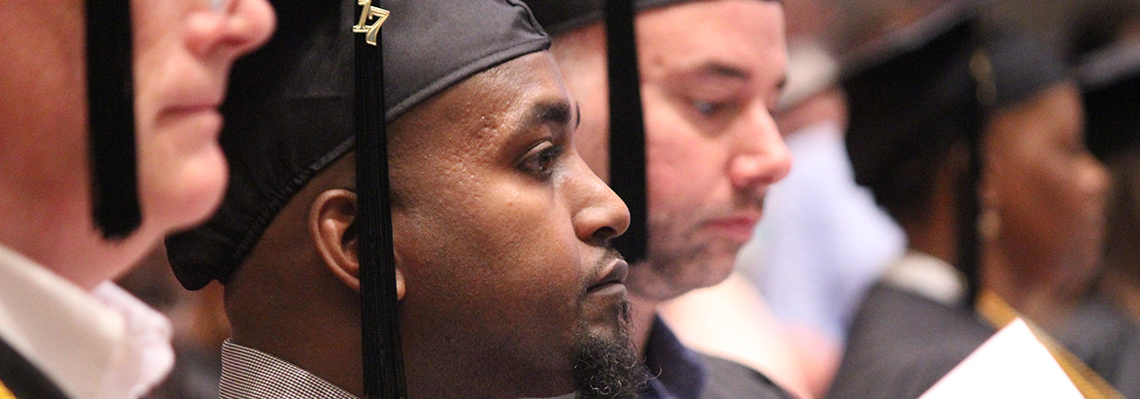Our new Master of Arts in Theological Studies degree (MATS) provides you with a strong theological foundation for church leadership or advanced studies.
It is designed for those who seek to explore a deeper theological understanding, prepare for further academic work, or probe questions of personal religious concern. You can tailor the program to fit your academic and career interests. You’ll complete a capstone project that allows you to delve deeply into an area that drives your curiosity.
Our fully accredited MATS program is offered online and in person on both the Lancaster Seminary campus in Lancaster, Pa., and on the Moravian Seminary campus in Bethlehem, Pa.
HERE’S WHAT IT TAKES
Our MATS is a 48-credit degree program. We designed an extremely flexible program to meet the various needs of our students.
There are 24 required credits and 24 credits set aside for electives.
You can finish in two years by taking 12+ credits per semester or finish in four-to-six years by taking fewer than 12 credits per semester.
Flexible and Innovative
Our MATS degree program is designed to fit both your busy schedule and your educational goals.
You have full-time and part-time options.
You can choose to take courses online or in person on either campus in Bethlehem and Lancaster.
We offer a weekend schedule with classes held on Friday evenings and Saturday mornings that is ideal for working adults.
Classes are held on Monday, Tuesday, and Thursday starting at 4:00 p.m. and 7:00 p.m.and on Friday starting at 7:00 p.m. There are no classes on Wednesday. Saturday classes are held at 9:00 a.m and sometimes at 11:15 a.m.
LEARNING OUTCOMES
Our MATS program addresses these learning outcomes:
- Interpret and critically analyze sacred and theological artifacts, and practices of your own and other traditions.
- Articulate and practice a theological and ethical understanding of authority, power, and accountability that recognizes, supports, and affirms the dignity and worth of all persons.
- Demonstrate depth of understanding and research competency in a particular area resulting in a coherent, researched discussion in an integrative project.
COURSES THAT REFLECT CONTEMPORARY REALITIES
Our courses are timely and relevant, driven by questions the Church and the world are asking. Combined with the deep learning at the heart of our rich academic heritage, you will be prepared for the challenges of contemporary religious engagement. Click here for the MATS 2024 Curriculum Overview.
Required Courses
Introduction to Theological Education
This course will introduce new students to the diversities present in the Seminary community and to institutional commitments toward forming a supportive community of learning and theological reflection. Students will be introduced to anti-racist frameworks, power, and privilege dynamics (to include the intersections of gender, sexuality, socio-economic class, abilities, etc.), and the role of language (inclusivity, pronouns, etc.) to include or exclude others. It will also introduce students to contemplative spiritual practices and theological writing.
Engaging the Questions Together
This course brings together students from a cross section of masters level degrees and certificates to engage significant theological, ethical, and ministerial/pastoral questions. It expects students to deploy insight and learnings from their current and prior coursework as they consider those questions. With attention to the social and spiritual implications of interpretation, the course requires students to deploy a variety of analytical tools and pastoral skills, with the acknowledgement that simplistic responses are inadequate for complex issues.
The MATS Research Seminar introduces students to a range of disciplines in the field of theological studies: historical, textual, and theological. Students will engage with major lines of interpretation and inquiry and learn standard forms of research and argumentation related to each field. Students will develop their skills in academic writing.
MATS Capstone Development assists students in preparing for their Capstone Projects by enhancing their research and writing skills. In multiple stages, students will develop proposals for their Capstone Projects that indicate their focus of study, research methodology, and basic bibliographic resources. Peer review constitutes an essential dimension of the learning experience.
This course involves the completion of the Master of Arts in Theological Studies Capstone Project. In consultation with a faculty Capstone advisor, learners will develop a project that builds a contribution based upon their own research.

